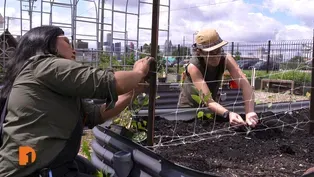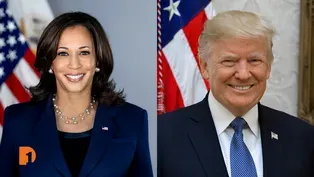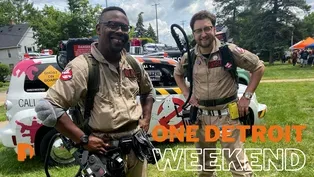
The 45th annual September is Black Reading Month
Clip: Season 9 Episode 11 | 4m 32sVideo has Closed Captions
September is Black Reading Month encourages people to read books by Black authors.
The annual September is Black Reading Month returns for its 45th year. The observance encourages readers to explore literary works by Black authors. Host Stephen Henderson talks with September is Black Reading Month Co-Founder Malik Yakini about the creation of the month-long observance and literary issues in America.
Problems with Closed Captions? Closed Captioning Feedback
Problems with Closed Captions? Closed Captioning Feedback
One Detroit is a local public television program presented by Detroit PBS

The 45th annual September is Black Reading Month
Clip: Season 9 Episode 11 | 4m 32sVideo has Closed Captions
The annual September is Black Reading Month returns for its 45th year. The observance encourages readers to explore literary works by Black authors. Host Stephen Henderson talks with September is Black Reading Month Co-Founder Malik Yakini about the creation of the month-long observance and literary issues in America.
Problems with Closed Captions? Closed Captioning Feedback
How to Watch One Detroit
One Detroit is available to stream on pbs.org and the free PBS App, available on iPhone, Apple TV, Android TV, Android smartphones, Amazon Fire TV, Amazon Fire Tablet, Roku, Samsung Smart TV, and Vizio.
Providing Support for PBS.org
Learn Moreabout PBS online sponsorship(gentle mellow music) - Black Reading Month, something you co-founded.
Let's start with just the origin of that.
How'd you come up with this idea?
- Well, in 1978, '79, myself and my wife at the time, Nkiruka Yakini, and Dr. Keith Dye had created a company called New Directions Information Institute, and we were distributing Black magazines and books trying to get them in kind of mainstream stores throughout the city.
So we noticed that grocery stores, for example, at the checkout counter, there were various magazines, but none of the magazines dealt with the Black experience, or those who dealt with the Black experience, dealt with entertainment and issues like that.
There were no real serious Black publications in the places where people went every day to shop.
So our attempt was to get those magazines and books in those kinds of stores.
And so for about two years we were distributing going every month dropping off magazines, like "Black Enterprise," and "Africa" magazine, and others that dealt with serious issues of the day.
But when we came back at the end of the month, we noticed only one or two had sold.
So we realized that it was more than just getting the publications, getting access to the publications.
We needed a public campaign in order to promote the importance of reading Black books and magazines.
And so we met with a number of other Black-book distributors and Black-book sellers in Chicago with Third World Press in the summer of 1980.
And out of that, we decided to come back to Detroit and do something concrete.
There had been a lot of discussion on the national level about some kind of promotional campaign.
We decided to come back to Detroit and create Black Reading Month, September is Black Reading Month.
- Yeah, yeah, and this is something that's celebrated in many different places now.
I mean, it's kind of an international phenomenon.
- Yeah, well, you know, especially with the advent of the information superhighway, as they used to call it, you know, people all around the country and around the world have become familiar with Black Reading Month and are celebrating it or observing it in various ways.
The most fundamental way that we ask people to celebrate or observe Black Reading Month is to read at least one book by a Black author during the month of September.
That's kind of the low bar, but at least one.
You know, and that might sound like it's not a big accomplishment, but the reality is, in American society, the average adult has not read a book in the last five years.
And so we have a tremendous problem with literacy in general, but again, with Black people in this country, people of African descent, we have the problem of living in a society which has intentionally kind of covered up our history, our culture, and part of that is the tremendous contributions that we made to literature.
- You have an event coming up in September around this as well?
- Well, actually, we were trying to get an event nailed down.
We don't have it nailed down yet.
I wish I could give you the details.
But I would just encourage people to stay tuned to the September is Black Reading Month Facebook page for that potential Detroit event.
There is one in Avalon Village, and I don't have the date in front of me right now, but there's a children's event which is going on that's been going on for multiple years.
But the main thing is that we want people in their own homes, not so much, you know, we used to try to get people to come out to big public activities, but in their own homes, we want people to do a couple things.
One, as I said, to read at least one book during the month of September by a Black author.
And then, two, for those who are up to it, we ask them to participate in the Turn Off the TV Challenge.
That is to turn off the television for the entire month, except for shows like "American Black Journal."
- Except for "American Black Journal," of course.
- Yeah, no, but seriously, which speak to our experience and help to uplift us.
But we're trying to break people from the habit of kind of mindless television watching.
And so the Turn Off the TV Challenge during the month of September is really a fast of sorts.
It's a fast to break our addiction to television.
It's a fast that enables us to take the time that perhaps we were using watching television in the past and use that to read, and also it's an exercise in self-discipline.
Keep Growing Detroit pursues food sovereignty, helps farmers
Video has Closed Captions
Keep Growing Detroit pursues food sovereignty with a focus on access to fresh produce. (7m 52s)
One Detroit contributors discuss 2024 Presidential Debate
Video has Closed Captions
Zoe Clark, Stephen Henderson and Nolan Finley discuss the 2024 presidential debate. (8m 2s)
Things to do in Detroit this weekend: September 6, 2024
Video has Closed Captions
Contributors Dave Wagner and Cecelia Sharpe share some events coming up this weekend. (2m 1s)
Providing Support for PBS.org
Learn Moreabout PBS online sponsorshipSupport for PBS provided by:
One Detroit is a local public television program presented by Detroit PBS














